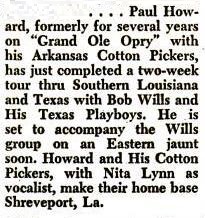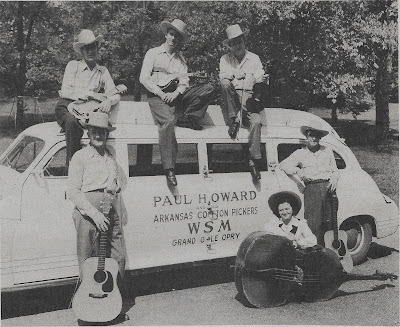Paul Howard's name, largely forgotten today and only remembered by hardcore western swing fans, should be listed in the Country Music Hall of Fame but unfortunately is not. His band, the Arkansas Cotton Pickers, was the first western swing orchestra to appear regularly at the Grand Ole Opry and brought the swinging, modern sounds to the Opy's listeners. The management of the show was as conservative as it gets, ignoring trends and changing styles in country music largely but Howard was given a spot nevertheless. Many musicians passed through his band - and some of them would develop into the genre's leading session musicians.
Paul Jackson Howard was born on July 10, 1908, on a farm near Midland, Arkansas, a small town not for away from the Fort Smith metropolitan area. Although raised on traditional old-time music and a fan of Jimmie Rodgers' blues drenched version of it, Howard was one of the first rural musicians to welcome the swinging sounds of western swing that came out of Texas in the 1930s. Jon Hartley Fox called Howard a "music visionary" in his book "King of the Queen City: The Story of King Records". Howard became not only a great fan of Bob Wills but also called him a friend eventually.
At age fifteen, Howard ran away from home and moved in with his sister in Kansas. For the next two years, he worked as a construction worker in Kansas, as a coal miner in Oklohoma and finally as a copper miner in Arizona. It was in Bisbee, Arizona, where he met a black man who taught him the first chords on the guitar. This led Howard to becoming seriously interested in music and he bought a guitar and an instruction book soon after. He started out as a performer in 1931, being heard on KOY in Phoenix, Arizona. However, he returned to Oklahoma in 1933 to work as a coal miner again to earn a living. Music was still on his mind and he soon landed a steady job with a movie theater in Fort Smith, Arkansas, where he performed as a Jimmie Rodgers clone during intermissions and after the movies had ended.
 |
| Billboard July 20, 1946 |
During the 1940s, many musicians that later became top names in Nashville went through the Arkansas Cotton Pickers. Guitarists Billy Byrd, Hank Garland and Grady Martin, bassist Bob Moore, steel guitarists Little Roy Wiggins and Sunny Albright, vocalist Nita Lynn - all of them and many more excellent musicians performed with Howard's band and gathered important experiences.
 |
| Billboard March 2, 1946 |
The Liberty release brought Howard to the attention of Columbia Records and his first release for the label appeared at the tail end of 1946, "Oklahoma City" b/w "Somebody Else's Trouble" (Columbia #37204). Over a stretch of two years, Columbia released a total of six singles but none of them became a national hit. In 1949, Howard signed with King and recorded another ten songs for the label from Cincinnati, although these releases did not sell better either.
In 1949, while still recording for King but frustrated with the situation, Howard decided it needed a change and moved from Nashville to Shreveport, Louisiana, where he became a steady member of the Louisiana Hayride, the Opry's competitor that was much more open for modern and innovative country music sounds. His last recording session took place in Shreveport at radio KWKH, which was released on King. Howard stayed with the Hayride until around 1951 but could not find success there either.
 |
| Billboard March 2, 1957 |
During these years, Howard and his band toured extensively through Louisiana, Texas, as well as Arkansas and could be heard over different radio stations. In 1956, he went into promotion, though he continued as a performer as well. He returned to Arkansas, where he fronted a band and toured the state during the 1950s and 1960s. He disbanded his band in 1973 and moved to Little Rock, Arkansas, in 1981, where he continued to book shows and to work with with a bluegrass band. He also returned to Nashville once a year for the Old Timers show and was also a member of the Country Music Association.
Paul Howard died June 19, 1984, in Little Rock, Arkansas, of heart failure. He was 75 years old. That same year, German Cattle Records released an LP with a collection of his recordings. Two CDs followed in 2010 on the TRG label and in 2013 by the British Archive of Country Music.
Sources
• Hillbilly-Music.com entry
• 45worlds.com/78rpm entry
• SecondHandSongs
• Country Music Hall of Fame
• Entry at Praguefrank's Country Music Discographies
• Steel Guitar Forum
• Find a Grave entry
• Jon Hartley Fox: "King of the Queen City: The Story of King Records" (University of Illinois Press), 2020, pages 80-81
• Max M. Cole: "Western Swing at its Best" (liner notes), Cattle LP 57
Sources for Arkansas Cotton Pickers members
• Sunny Allbright
• Jimmy Byrd
• Bob Moore
• Nita Lynn
• Little Roy Wiggins
• Grady Martin
• Hank Garland
• Rollin Sullivan


No comments:
Post a Comment